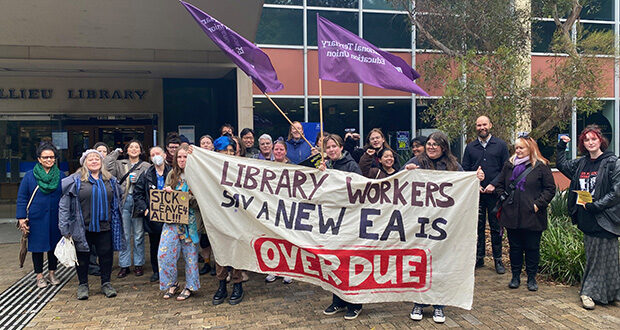Professional university staff say they facing "crisis" levels of stress and workload in the wake of rolling university restructures and back-and-forth contract negotiations with academics.
Last week, thousands of university staff walked off their jobs as part of an ongoing wave of industrial action across Australia’s tertiary sector.
Staff from five Victorian universities gathered in Melbourne as part of a coordinated strike for reduced casualisation and higher pay.
Chloe Mackenzie, a professional staff member from the University of Melbourne and an NTEU branch vice president, was among them.
"It's been really, really tough," she told Campus Review.
“There is a constant workload shift every time something happens, and the work has certainly increased to try and meet those challenges, but staffing is lower than ever."
According to Mackenzie, admin teams have struggled to keep up with work leftover from staff who either resigned or were made redundant during Covid-19.
Paired with the fallout of two major university wage theft cases and a rapid shift to online learning, essential university support workers have "reached their limit", she said.
“It's not a simple thing of just pushing back because if professional staff don't do our jobs, students suffer, academics suffer, our other professional staff colleagues suffer.
"I think we will see mass movement of professional staff elsewhere, potentially outside the university sector, because I think so many just can't do it anymore."
Non-academic staff make up roughly 56 per cent of Australia’s tertiary workforce, according to the most recent federal higher education data.
During Covid-19 professional staff accounted for the majority of job cuts made by universities, with full-time equivalent numbers dropping by 73,620 in 2020 to 66,907 in 2021.
Katie Wood, who has worked in the library at the University of Melbourne for 15 years, said workload issues were exacerbated after the university cut 540 administrative jobs back in 2014.
"I know personally many dedicated, expert colleagues who lost their jobs when the work still needed to be done," she said.
"Those of us who remain feel undervalued, like we’re just treated as a burden to be overcome."
A spokesperson from Melbourne University said the university was "committed to providing a safe and supportive environment for all staff and students."
"Workload is actively and fairly managed through provisions set out in the enterprise agreement including opportunity for review," they said.
"Health and wellbeing is and always will be a major priority for the University of Melbourne."
Do you have an idea for a story?Email [email protected]
 Campus Review The latest in higher education news
Campus Review The latest in higher education news

